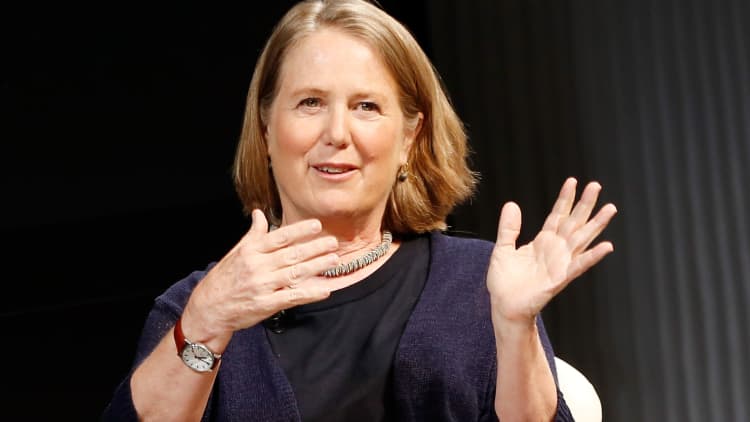
Google is holding a big conference called Google Cloud Next to celebrate and promote its cloud computing efforts this week in San Francisco.
The company claimed more than 10,000 people showed up to hear the latest about its cloud platform, which has emerged as the No. 3 in the space after Amazon Web Services and Microsoft Azure. Google CEO Sundar Pichai said that the cloud is an "extraordinarily big bet" for the company. Eric Schmidt, who was Google's CEO and is now the chairman of parent company Alphabet, said: "We're here for real, you're here for real, this is an incredibly serious mission. It's something I wanted to do since I joined the company 17 years ago."
The event is also a bit of a coming-out party for Diane Greene, who is a legitimate big deal in the world of enterprise computing. She was a co-founder and the first CEO of VMware, the company that popularized a technology known as virtualization in the early 2000s. (Basically, virtualization lets you use software to run multiple computing instances on one piece of hardware, and is a foundation of cloud computing.) Greene joined Google's board in 2012, and was named the head of its cloud business in November 2015.
So it was a little surprising that the company did not have any huge news to announce in its opening keynote on Wednesday, which stretched over two hours. Probably the biggest deal was a partnership with SAP to run that company's HANA database -- SAP's answer to Oracle's in-memory databases, and a big bet for the company for the last five years or so -- in Google's cloud.
What's really going on here? Is Google serious about the cloud or not?
Alphabet investors should keep in mind that Google's cloud business is a tiny part of Alphabet's overall business.
In 2016, Google's "other" revenues amounted to $10.1 billion, or 11.2 percent of Alphabet's total. (This is different from the Alphabet "Other Bets" revenue, which includes businesses like fiber-optic internet access and self-driving car technology.)
In its financial filing, Google breaks down those "other" revenues as:
- Apps, in-app purchases, and digital content in the Google Play store;
- Hardware;
- Licensing-related revenue; and
- Service fees received for our Google Cloud offerings.
Google Cloud is No. 4 on the list (although that doesn't necessarily mean it's No. 4 in revenue or importance).
Overall, the segment grew revenues 40 percent from the previous year. That's a lot faster than Alphabet's overall revenue growth of 20 percent. So, there's definite upside.
But some perspective is still due. Google has been selling enterprise offerings, first for productivity, and more recently for infrastructure, since 2006. And yet 88.8 percent of Google's business still comes from internet advertising, with the bulk of that almost certainly coming from search advertising. (Google does not break out search ad revenues separately.)
That core business is still growing at a very impressive rate, and has great profit margins.
So why invest in a complicated business that goes up against some of the biggest and most cash-rich names in technology, both old -- like Microsoft, IBM and Oracle -- and new, like Amazon?
For a cynical take, one might turn to investor Peter Thiel's comments at CERAWeek by IHS Markit, an energy industry conference, on Tuesday night.
Thiel -- who is a board member and early investor in Facebook, one of Alphabet's fiercest competitors -- noted that he only wants to invest in monopolies. Then he talked about a hypothetical search company in Silicon Valley:
If you have a monopoly, you will tell people you are in a super-competitive business. And if you are in a super-competitive business, you will tell people that you have a monopoly of sorts.
So for example, if you have a search company in Silicon Valley that I will not name, if you were to go around to CEOs saying, 'We have a bigger share of the market and higher profit margins than Microsoft ever had in the 1990s,' you wouldn't do that...You don't even talk about search. You say, 'We are a technology company with an enormous space called technology, and we're competing with Apple on smartphones, and we're competing on self-driving cars, and there's competition in everything we're doing except this one thing called search, and we never talk about that.'
A slightly less cynical take: Investing billions in cloud computing might not make sense on a stand-alone basis, but if Alphabet is already investing billions in data center technology for its actual business, why not try and leverage some that technology into a whole new area as well, by selling it to other businesses? It's a low-risk bet. And a lot of companies are buying -- Snap, for instance, says it will spend $400 million a year on Google's cloud for the next five years.
Just don't expect Alphabet to give a clear definition of "success" in cloud, or a clear timeline for that success, to anybody outside the company.


